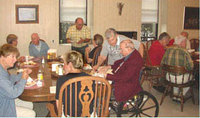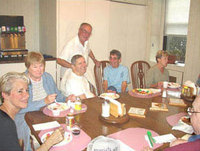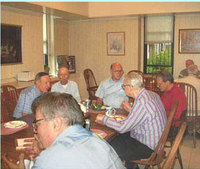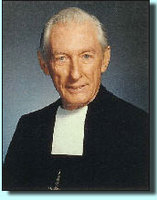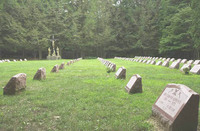Marists All December 2003
ISSUE # 74
from DAVID KAMMER (’42):
The annual GMC picnic ran into inclement weather on September 18th, the first time since in the 1980’s when we had a near hurricane/blizzard at the Roosevelt Park site near Mt. Kisco. This year rain, fog, and dampness chased us from the Mount St. Michael garth to the Brothers’ dining room on the bottom floor of Champagnat Hall. Yet, there was a very good showing of about forty-to-fifty people. The closeness of quarters made for friendly interchange. Besides the regulars, who can always be counted on to attend, there were people who hadn’t attended before. Among them were Br. Alfred George, Mark Moran, Bob Joyce, and Jim Guldner. Among those whom we were pleased to see after a few years were Ray Landry, Rich Foy, Sue and John Wilcox, Jim Friel, and John Brady. As usual, the Brothers were very hospitable. Seeing that all went especially well were Br. Jim Devine and Br. John Herrmann. Most of the Brothers of the Mount community were on hand. Getting special respect and recognition were Br. Luke, Br. Valerian, and Br. Simeon; together, they have completed 212 years of Marist life and service!
Update on the Marists All Web Site: We would like to remind all that we have postal and e-mail addresses listed on our Marists All web site at the drop-down button “Contacts” and “List of Contacts.” Some of our correspondents, especially some of the Brothers, are not posted. Since we do not wish to neglect anyone, we encourage you to share your addresses with us. Please write to David Kammer If you are receiving a printed copy of this issue of Marists All, we do not have an e-mail address for you. This does not apply to those who have explicitly requested receiving a hard copy. If you have changed your e-mail address or have recently acquired an e-address, and you would be satisfied to be notified of and to read each new issue on our web site, please send that e-mail address to David Kammer. We would then save on expenses of printing and postage costs. Thank you.
In Memoriam
(The Marists All editorial board has recently agreed that, rather than include complete obituaries and eulogies in our printed Marists All, the printed articles referring to deaths of our confreres will remain confined to shorter notices and testimonials. Complete obituaries may still be read on our web site. Editor)
Br. Stephen Urban Minogue’s eulogy, delivered by Br. Philip Robert Ouellette, celebrates the joy and holiness of Br. Stephen’s life. Br. Philip’s refrain, “He truly gave us all a glimpse of God,” is a fitting summary of Br. Stephen’s legacy. The entire eulogy may be read by accessing the Marists All web site at the Obituary (2000 – Present) web page and/or at the Obituary (alphabetical) web page.
Br. Stephen Martin Holstein (’47) died on the morning of October 8th. He had been hospitalized in Miami for several years with symptoms of Alzheimer’s disease. We send our condolences to Steve’s family, especially to his sister Jeanne Schultz who has kept in touch with Marist news through several channels, including Marists All.
In a recent provincial newsletter former Marist Joe Hager’s (’63) name was mentioned in a request for prayers on behalf of the deceased. According to the report, he died on September 5th of an apparent heart attack resulting from complications from congestive heart failure and diabetes. Another reference was made -- in a Marist College memorial for graduates who have died -- about Jerry Worell (’61). Hopefully, someone within our network of readers might be able to provide further information so that we might more fully acknowledge their deaths.
Bill Reffelt (’58) was laid to rest on September 17th after losing his struggle against cancer. His easy-going style endeared him to all. His positive attitude was enhanced by John O’Connell’s continuous efforts over the last year to bring together what he called the big “B” and the small “b” friends of Bill to encourage him and bring him cheer.
M. John (Okee) O'Connell remembers Bill Reffelt:
Most Marists, present or past, never had the opportunity to know and "be with" our brother Bill Reffelt (once Br. William Anthony '58...we were the last group to "take" names), but he was a special guy you all would have been glad you knew.
Prompted by conversations with David Kammer (once our "Master of Novices") during the Summer of '01, soon after both of us had heard of the passing of Vinnie Hall and were saddened that his passing had gone so unacknowledged, I caught up with my old friend Bill in January '02, reconnecting with him after too many years apart, years necessarily caught up in building our lives, providing for and raising our families (he on Long Island and me in MD)...only to discover that he had been diagnosed with terminal lung cancer a little more than a year earlier, and was "given" only until the Fall of 2002.
Bill died with family around him in the early morning hours of September 13, 2003, more than a year beyond what was "given." Not wanting this passing to go unacknowledged, I would like to connect his presence among us earlier, during those incredibly indelible formative ("character-building") years in Esopus-Tyngsboro-Poughkeepsie (from August 1955 through June 1960), with this past year or so, a "fast-forwarding" of a Marist bond of togetherness and unconditional mutual regard which was established more than 40 years earlier.
So many of us are so much more grateful this Thanksgiving that we had this special guy to pull us together and had an extra year of his life added to re-establish our connection with him in the here and now. The fact that eleven of his classmates, nine of them not in touch for more than four decades (Tom Fahey, not since January of '57), would travel great distances (from Arizona, California, Florida, Illinois, Maine, Maryland, New Jersey, way up-State NY, etc., some many times) just to "be with" with him is testimony enough that Bill Reffelt and the bond among us established back then was, and now is again, something special.
Bill's easy-going nature is what endeared him to us back then...and what made it so easy (and fun, actually) to be with him during his final months here. Such a talented individual, a gifted natural athlete and musician (the piano, by ear...and the only guy we knew who could yodel and sound good doing it!), Bill didn't have a pretentious bone in his body...made you feel better about yourself just being around him. For him, being a great husband, father, grandfather, teacher, friend...a well-loved man...was more than enough.
What was to become a "series" of visits from classmates began just before Thanksgiving a year ago (11/4/02), each time including a "mystery guest" (or "guests"), most introduced in "this is your life" fashion...from being "the-voice-from-the-past" in the garage next to his family room in Shoreham to posing as "doctors" while he was in his chemo chair at the hospital.
The first was with George Conboy (who flew in from Tucson, five times in those last ten months), then with Pat Murphy in December, and then with Tom Fahey, Eddie McCarthy, Bernie Ortueste, Vin Poisella, Bill Shannon, Richie Shaw, Bob St.Amand, and Russ Therriault, also joined by "under-classmen" Br. John Hermann and Joe Picciano.
Bill just delighted in these visits, and we "visitors" were/are convinced that these gatherings ("Whenever two or more are gathered....") had a lot to do with his tumor actually shrinking for a time and, thus, for the ten months of extra time we had with him here. Many others were in touch with him, directly or indirectly: classmates Mike "Dom" Apostoli, Br. Ernie Beland, Pete Kuveke, and Mike Sugrue, and "upperclassman" Bill Maloney. Underclassmen Paul Stengel (a regular weekly visitor to do Bill's chores around the house), Jim Gargan, Tom Hourican, Jack Meehan (great bagpiper at Bill's funeral), and Frank Sutton were others drawn to connect with Bill Reffelt.
Bill was a great and loving husband and best friend to Elaine ("Bill made me feel special all the time"...a great "mutual admiration society," they would have celebrated their 41st Anniversary in October)...a super caring, supportive and proud father to Krissy, Jimmy and Jenny...and an especially appreciative and grateful grandfather to Andrew, Katie, Allison and Kayla (Boy, he loved those kids...he was just so pleased "to still be around" for Kayla's birth last Spring)...and a friend to so many of us, then and now.
Rest in peace, Bill Reffelt...you have enriched our lives, and we miss you, and certainly we feel your presence among us even now...especially this Thanksgiving '03, thanks is given to you for causing us to recognize and appreciate once again that Marist bond of togetherness close to the core in all of us, for bringing so many of us together once again, in actuality and in spirit.
*NB: Our "Oh B/brother, Thou Art Where?" listing of Marist classmates of ours includes over 225 B/brothers from our group (the '58's), the two groups behind us and one group ahead of us...with about 130 located: 15 are now deceased, about 80 have been identified w/ e-mail addresses, and about another three dozen (36) with postal addresses. We hope to "gather" together those inclined and able to do so at Holy Rosary in Esopus once again on Good Friday, this April 9th, 2004.
from ED CASTINE (’50): How fitting that Br. Stephen Urban died on the feast of the Blessed Mother’s Nativity! Many of us recall him as a dorm prefect at Marist Prep, and even more so as an outstanding teacher and confidant. Through his dedication, encouragement, and assistance, we completed Latin II and Latin III in one year and were able to finish two years of French because of that. Anyone else remember how he prepared the juniors to sing “The Holy City” for the send-off to the Philippines of the first Marist missionaries? He was indeed a great presence and influence on all of our lives. Recalling Br. Stephen, I also remember the other outstanding Brothers on the faculty during those years: Br. George Robert, Br. Regis James, Br. James Damian and Br. Leo, among others. We were so fortunate and blessed. May they and all our Marist friends and brothers preceding us rest in peace. On a more personal note, I remember vividly just before leaving the congregation how I enjoyed a very special visit and discussion with Br. Stephen, a discussion I will never forget. He will always have a unique place in my prayers, in my gratitude, and in my memories.
from JOE HORAN (’50): Mrs. Casey’s thoughts about Frank in the last issue were inspiring. Love has no bounds. We just grow with those we love. I know each of us in the class of ’50 remembers Frank well. I can still recall the many adventures we had together in the Juniorate, especially Frank’s ability to ace the Regents. He was always upbeat and just an all around wonderful person. We may be growing older, but the memories of our young lives are still very vivid. We certainly were blessed with a wonderful group of guys.
from GUS NOLAN (’48): The Esopus Cemetery:
photo by Victor VanCarpels (Sept 2001)
courtesy of the Marist Brothers in Esopus web site
Esopus is a place that continues to bring up very fond memories for many of us. In recent years it has also been a place to which we return with a mixture of emotions: the joyous celebration of lives well lived and the sadness at the loss of friends. Over the past several months, the deaths and burials of Brs. Sixtus Victor, Stephen Urban, and Stephen Martin brought these emotions to the surface. Each occasion was marked by a very familiar pattern: the arrival of the hearse at the Esopus property, the lineup of Brothers and friends, and a slow walk to the cemetery while reciting the rosary aloud. A short prayer ceremony and a talk at the gravesite concluded with the singing of the Salve Regina.
A reception usually followed in the dining room where members of the family greeted those attending. At these occasions there is no sense of gloom; family and friends speak of happy events of the past, often sparked by some remark or story of a member of the family. Steve Urban’s niece seemed to have the same spirit as Steve; Vic’s brother, a retired priest who celebrated the Mass, exhibited the same family spark; and Steve Martin’s sister, Jeanne Schultz, and her daughters recalled stories of their George, our Steve Martin.
Some may recall a time when there was no cemetery in Esopus. The ground there has since become sacred with the burial of more than 170 Marist Brothers since 1954 when Br. Joseph Orens became the first to be buried in that corner of the property. Br. John Klein, U.S. Provincial, has noted that in the not too distant future, an extension of this plot or the acquiring of a new place will need to be decided for the burial of the brethren.
from MICHAEL O’NEIL (’61): Mary Ann and I have recently been divorced. We stay in touch on a bi-weekly basis to continue to involve ourselves in raising and coaching the kids and our six grandchildren. We both have significant others in our lives now, and that is a good thing. As difficult as the separation has been, it has from the beginning been amicable, and we continue to love and care for one another.
In other developments, I decided three years ago to get back to coaching. I approached our local high school coach and athletic director and asked if I could help out in the program. They welcomed me with open arms, a lot of confidence, and a free rein to contribute as much as I could. We’ve had lots of success, and it was a pleasure to reconnect with that wonderful part of my past.
Business-wise, I have begun the rejuvenation of The O’Neil Group Inc. We have a new web-based tracking tool to help organizations resolve and implement mission-critical issues.
from WILLIAM BYRNE (’52): In reading over past issues of Marists All, I relive in my mind stories I’ve been told or events I’ve witnessed in my Marist years. Before they get lost forever, here are a few for the retelling.
The first one purportedly took place at Mt. St. Michael’s in the communal bathroom stalls familiar to all of us. The story goes that former Br. William Bernard was saddled with the responsibility of changing the water and cleaning the fish tanks in his classroom lab. He would wait until he was sure that Br. William Otto occupied one of the stalls, and in the next stall, slowly and deliberately empty a tank into the bowl, creating the illusion of an elephant relieving itself! The mystery was resolved only when Br. William Otto burst out of his stall one morning in a state of near undress and caught the phantom elephant in the act.
Another memorable incident involves the recently deceased Bill Murphy. Br. Terry Jones was enrolled with Bill Murphy in a Saturday morning math class at Fordham University, both pursuing advanced degrees. According to Terry, they were both taking the final exam that the teacher had written on the blackboard. Bill Murphy finished the exam in record time and patiently waited for Terry outside the classroom. Then Terry emerged. They shared notes on the exam and Terry asked his colleague what he thought of the third question. Bill Murphy’s incredulous reply was, “What third question?” It seems that in his haste, Bill Murphy neglected to look on the classroom sideboard for the final question!
This final anecdote also involves Bill Murphy. In the Tyngsboro large dorm room, the shower stalls were located along the back wall, adjacent to a room occupied by Br. Giles. The fire escape was situated between that room and the end of the shower stall area. Bill Murphy was assigned to teach a speech class that summer. (Who among us will ever forget our attempt to master the sense and delivery of John Milton’s sonnet on his blindness, something I’m sure many of us can still deliver by heart!) One of the novices had emerged from the shower, and prior to retiring, had the habit in fair weather to go out onto the fire escape and liberally douse himself with an after shower powder. Imagine these tiny particles, which had not attached themselves to a waiting body, slowly descending to the next level of the fire escape. Who should happen to be at that moment having a cigarette one floor below, but Bill Murphy, still wearing his soutane. I had emerged from a classroom on that floor at the moment the fire escape door flung open and an irate Murph came storming by me, covered with this powder residue and muttering under his breath!
Hopefully, I have struck a chord of remembrance for others. Any “heritage” project should certainly include the gentle humorous things that we all have experienced as part of the Marist family saga. One of the things that makes us distinctly human is the ability to be self-reflective and to be able to laugh at ourselves!
Marist College Homecoming Weekend
from GUS NOLAN (’48): Each fall Marist College experiences its Homecoming, the annual occasion to invite back to the campus its graduates for class reunions. October 10th through 12th marked the occasion this year. Special attention was given to graduates celebrating their fiftieth, twenty-fifth, tenth, and fifth year anniversaries. This year the college decided to add a unique theme -- “celebrating our heritage” -- by having two other significant events during this same weekend: a celebration honoring Marist’s newly designated Heritage Professors, and the dedication of the Foy Townhouses.
Thirty-eight faculty who served the college for at least twenty-five years starting before 1971, were honored on Friday with a luncheon and granted a Board of Trustees’ certificate in “recognition of unique contributions in the early development of Marist College.” Of this number, fifteen were/are officially associated with the Marist Brothers, and one, Dan Kirk, is deceased. Anthony Campilii, ’62, CFO and Vice President for Business Affairs, was also honored for his forty-one years of service to the college.
On Saturday, the Townhouses, which served as housing for students, were dedicated to honor Linus Richard Foy, President of Marist from 1958-1979. Dennis Murray, President of Marist, offered remarks, and Anthony Campilii spoke about his work with Dr. Foy. Richard Foy gave an appreciative response, expressing his wish that the Townhouses not be named after himself personally, but after the whole Foy family to whom he owed so much.
On Saturday evening, a reception was held in the Marist Student Center for the classes being honored over the weekend. The occasion was marked by the presentation of Marist gold watches to each member in attendance celebrating the fiftieth year of graduation. Included in this group were very familiar names: Brothers James Kearney, Bernard X. Nolan, Richard Rancourt, James Ryan, Rev. Richard Tinker, along with Jeptha Lanning and Tom O’Connor. A dinner followed the reception, which in turn was followed by a traditional Marist singing session led by Richard LaPietra with Richard Rancourt at the piano. The evening ended with a rousing rendition of “Jerusalem, the Holy City.”
On Sunday a memorial Mass for alumni was celebrated by Rev. Richard LaMorte in Our Lady Seat of Wisdom Chapel. Special focus was given to the members of the Marist Community who had passed away during the year, including Trustees Jack Garland, Jack McEnroe, Frances Reese, and Henrietta Smith. Well-known faculty included Dorothy Ann Davis, Bob Norman and Bill Olsson. And included among the thirty-nine alumni were: Francis X. Casey, ’54, Rev. Larry Keogh ’58, Br. Stephen Martin ’47, Isidore Sabeta ’70, and Jerome Worell ’65.
from JIM FRIEL (’52): Three of us drove to Marist College for the Homecoming in October: Jim Gargan, Tom Murphy (Binsky), and I. We shared a room. Tom drew the air mattress. He assured us the next morning that we both snore. Over the weekend we were impressed by the students of Marist College: smart, savvy, and quite polite. A major event was the dedication of the Foy Townhouses. Dr. Richard Foy gave a beautiful talk emphasizing the role of the Brothers in the history of the College. We then drove to Esopus to honor Br. Steven Martin who had just passed away. A beautiful ceremony followed, appreciated by both his birth family and his Marist family.
from BR. JOHN MCDONNELL (’59): I’m writing to let you know that, after two years home from Rome, I’m being called to the Marist Asian Pacific Center (MAPAC) in Manila, the Philippines. I’ll be doing formative and spiritual accompaniment with some of the thirty-eight temporary professed Brothers from all over Asia and the south Pacific, as well as the twenty temporary professed sisters who are working on their bachelor’s degrees. Added to this, I will be doing some teaching and administration work to fill in the time. Little did I think when Br. Paul Ambrose asked us as novices in Tyngsboro who’d like to be a foreign missionary that it would take me forty-four years as a Marist to finally become one! I made the twenty-six hour journey to Manila from Newark on October 1st. May God continue to spoil me outrageously. Let’s unite in prayer with and to Br. Steve Urban and Bill Reffelt. May they rest in peace.
Dialogue: Beginnings
(Several voices over the past couple of years – most recently that of Gus Nolan -- have recommended that Marists All be used as a vehicle for discussion and dialogue. Rich Foy calls this an evolution “into a mechanism of swapping ideas of the future rather than remaining as a story of the past.” -- Editor)
The following excerpts stem from an interview made by Br. Luis Serra of Br. Andre Lanfrey, a Marist and an historian. The interview, entitled “The Catholic School Can Only Be Relevant if It Promotes Human Development Through the Search for Truth,” appeared in the Marist Bulletin, #91, published by the Institute of the Marist Brothers in Rome, September 11, 2003. The entire article appears at www.champagnat.org.
Br. Andre Lanfrey, 60 years of age, was born at Chambery, Savoie, France. He entered the Marist Brothers at the age of 17. He has a doctorate in History from the University of Lyons where he defended his thesis: Secularization, Separation and the School War. The French Catholics and the School (1901-1914). This thesis has been published by the well-known publishing company, Cerf (Paris 2003). A teacher and a researcher, he has studied, in particular, the history of the Institute. He was a delegate to the 20th General Chapter. At the present time he is a professor of History in two teacher education universities at Lyons and at Grenoble.
What effect did the start of the 20th Century have on the Marist Brothers as an order?
The political climate from 1880 onwards forced the congregation to raise the intellectual level of the Brothers. The training of the Brothers increased in time through the advent of juniorates and scholasticates. In the larger boarding schools the teachers reached a higher standard of education, often on their own merits through their own personal study. Religious formation also improved. The exercises of St. Ignatius were introduced, as was the second novitiate. The Brothers were better trained and often more motivated in their work and so the Institute was able then to establish solid foundations in many places in the world and to remain firmly founded in France.
The real failure of the Congregation was its inability to face the challenge presented by secularization. Since 1880, teaching no longer only involved the study of the Catechism: it now covered all subject areas. A lay teacher could often do this job just as well as, if not better than, a religious. Those who had been secularized could live out successfully this difference between the professional and religious aspects of teaching. They were no longer teachers because they were religious but were teachers and religious, faithful to their own individual consciences rather than to the body of the congregation. Thus they invented a new form of religious life founded on individual freedom rather than on obedience and community. But the Institute would not integrate the richness of their experience.
Those Brothers who had left France continued to live their religious life modeled on a form of monastic life characterized by the wearing of the habit, the rule, and by living in community. This model of religious life continued until the Second Vatican Council, but its collapse at this point showed that it had long since lost its relevance and that it could only continue to succeed through an openness and willingness to change. That’s why we saw so many religious leave their congregations after 1965 – because the congregations had never taken notice of 1903 as a sign of the times but rather saw it only as a simple setback to an immutable tradition. Now they had to rethink things.
That’s why 1903 cannot be seen as a providential exile that allowed the Institute to expand throughout the world. Firstly, this expansion had already started before this. Secondly, the large number of departures in a brief number of years destabilized the Institute rather than helped it. And the dramatic circumstances of this time prevented the Institute from looking to a new interpretation and evolution of religious life. We had to wait until the last decades of the 20th century for the Institute to undertake a serious look at its relationship with the world and its traditions. But it is true that it could hardly anticipate the general attitude of the Church.
What is the specific contribution of the Catholic school in the field of education?
Today the Catholic school remains pertinent on condition that it sees the secular world and the religious world in balance. Thus, the educational disciplines are not seen as props for the faith: mathematics, physics, literature have their own place in searching for truth. But for all that, secular knowledge is not the only aim: the school must promote an ethos that allows its students to see themselves in relationship with God, their origins and other people. At other times, the Catholic school has inculcated this sense of belonging in an authoritative manner, which had the benefit of giving support to the students but also the disadvantage of developing an attitude of either submission or revolt.
It seems to me then that the Catholic school can only be relevant if it promotes human development through the search for truth, whether this be immanent or transcendent. Thus, knowledge and faith are seen for what they are, not subject to authorities but inscribed in a tradition of discovery and as an invitation to pursue the task of confronting the mysteries of nature and of beings in order to bring about the fulfillment of the earthly city and the city of God. In fact, the most pertinent image of the learner and of the saint, but also of the educator, is Jacob’s nightly battle with the angel, which led to the new day and to the blessing.
response from RICHARD FOY (’45): …the struggle to refashion “Catholic” education goes on in the USA. Marist College in particular attempts to reconcile the sacred with the profane, with the sacred being voluntary rather than mandated. A good many Catholics of conservative bent are annoyed at the College because of its most recent commencement speakers: John Kerry and Eliot Spitzer. But the college cannot become a one-issue institution: abortion being the issue in the case of both Kerry and Spitzer. Ironically, Marist’s juridical structure is the same as Fordham, Manhattan and Iona. But the latter colleges maintain the appearance of being “Catholic” by having a priest or religious as President. (We made our changes based on the recommendations of two professors at Columbia School of Law for Fordham and which Fordham followed before us.) But somehow Marist is pagan; Fordham is religious.
In the long run, I see a major conflict between those who accept authoritarian rule and those who insist on individual freedom…. The same conflict exists within the Church. Clearly, our present Pope comes from an authoritarian background and has been diligently surrounding himself with like-thinking bishops both in Rome and in important positions around the world. But the end result is the disassociation of many Catholics from the established Church. And recent stories in the USA destroyed any idea that the hierarchy always knew best. Brother Andre’s essay speaks about 1903, but realistically it points to a much larger task of having each of us and each of our institutions adapt to a changing world. I wish I knew the answers, but being a Christian means seeking the truth every day of our lives.
Source: Original Marists All Site
Marist College | Marist Archives & Special Collections | Contact Us | Acknowledgements
